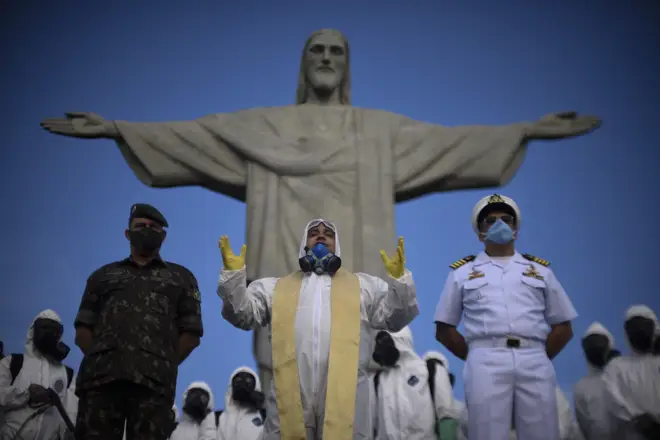
Iain Dale 7pm - 10pm
29 September 2020, 01:50 | Updated: 29 September 2020, 06:28

Global coronavirus deaths pass one million
More than one million people have died worldwide after testing positive for coronavirus, according to Johns Hopkins University figures.
The grim milestone was reached in the early hours of Tuesday morning with the current Covid-19 death toll now standing at 1,000,555.
Of those, more than one-fifth have occurred in the US - which has recorded 205,031 fatalities - while in the UK the tally now stands above 42,000.
Johns Hopkins University's Coronavirus Resource Center has been tracking the number of global deaths since the start of the pandemic, taking into account individual government and World Health Organisation updates.
The number of confirmed cases of Covid-19 across the planet now stands above 33.2 million, with the US, India and Brazil accounting for more than half of all infections.
Figures from Worldometer, which also collates data on the coronavirus pandemic from governments and non-governmental organisations (NGOs), suggested the one-million mark was surpassed on Sunday.
Read more: WHO aims to roll out faster Covid tests for poorer nations
Read more: US coronavirus deaths top 200,000

UN Secretary-General António Guterres called the update a "mind-numbing" figure and "an agonising milestone".
"Yet we must never lose sight of each and every individual life," he said in a video message.
"They were fathers and mothers, wives and husbands, brothers and sisters, friends and colleagues. The pain has been multiplied by the savageness of this disease."
Dr Howard Markel, of the University of Michigan, said: "It's not just a number. It's human beings. It's people we love."
The professor of medical history, who has advised government officials on containing pandemics and lost his 84-year-old mother to Covid-19 in February, added: "It's our brothers, our sisters. It's people we know.
"And if you don't have that human factor right in your face, it's very easy to make it abstract."
Our world has reached an agonizing milestone: the loss of 1 million lives to #COVID19.
— António Guterres (@antonioguterres) September 29, 2020
We must never lose sight of each & every life.
As the hunt for a vaccine — affordable and available to all — continues, let’s honour their memory by working together to defeat this virus. pic.twitter.com/iZ1UnN8d4i
Despite the virus emerging in Wuhan, China, towards the end of last year, the Far East Asian country has only recorded 4,739 deaths and 90,493 cases.
Since then, coronavirus has gripped the planet, health services and economies with few exceptions - including the world's leading and emerging superpowers - with infections being reported in more than 210 countries and territories since the pandemic began in December 2019.
Twelve countries have laid claim to staying coronavirus-free throughout the pandemic: Kiribati, The Marshall Islands, Micronesia, Nauru, Palau, Samoa, Solomon Islands, Tonga, Tuvalu, Vanuatu, North Korea and Turkmenistan. However, the final two countries' positions on that list are widely considered doubtful due to the highly secretive and often-censored nature of their regimes.
The other ten have likely benefited from their geographically isolated positions in the South Pacific Ocean, but all have still been impacted by the lack of tourism coming into their countries.

LBC goes inside an Intensive Care Unit during coronavirus crisis
A number of countries, including the UK, have invested millions of dollars, pounds or rubles into the development of a vaccine for Covid-19, with Russia, in August, becoming the first country in the world to approve one.
The milestone comes after a significant rise in cases across Europe, which triggered local lockdowns both here in the UK and overseas in nations such as France and Spain.
US President Donald Trump and Brazil's Jair Bolsonaro dismissed the severity of the threat and the guidance of scientists, even as hospitals filled with gravely ill patients.
Brazil has recorded the second most deaths after the US, with about 142,000. India is third and Mexico fourth, with more than 76,000.
The virus has forced trade-offs between safety and economic well-being and the choices made have left millions of people vulnerable, especially the poor, minorities and the elderly.

Boris Johnson’s address to the nation on coronavirus
The pandemic's toll of one million dead in such a limited time rivals some of the gravest threats to public health, past and present.
It exceeds annual deaths from Aids, which last year killed about 690,000 people worldwide.
The toll is approaching the 1.5 million global deaths each year from tuberculosis, which regularly kills more people than any other infectious disease.
Lawrence Gostin, a professor of global health law at Georgetown University, said: "Covid's grip on humanity is incomparably greater than the grip of other causes of death.
"We're only at the beginning of this. We're going to see many more weeks ahead of this pandemic than we've had behind us."
Meanwhile, thousands of the world's sporting, cultural and musical events, big or small, have all been impacted by the pandemic.
Rio de Janeiro's Carnival has been postponed for the first time in a century due to Brazil's ongoing battle with Covid-19; in Japan, the Tokyo 2020 Olympics were moved to next year; the annual Hajj pilgrimage performed by Muslims around the world was significantly scaled back in July; and here in the UK, Glastonbury was cancelled on its 50th anniversary.
Listen & subscribe: Global Player | Apple Podcasts | Google Podcasts | Spotify